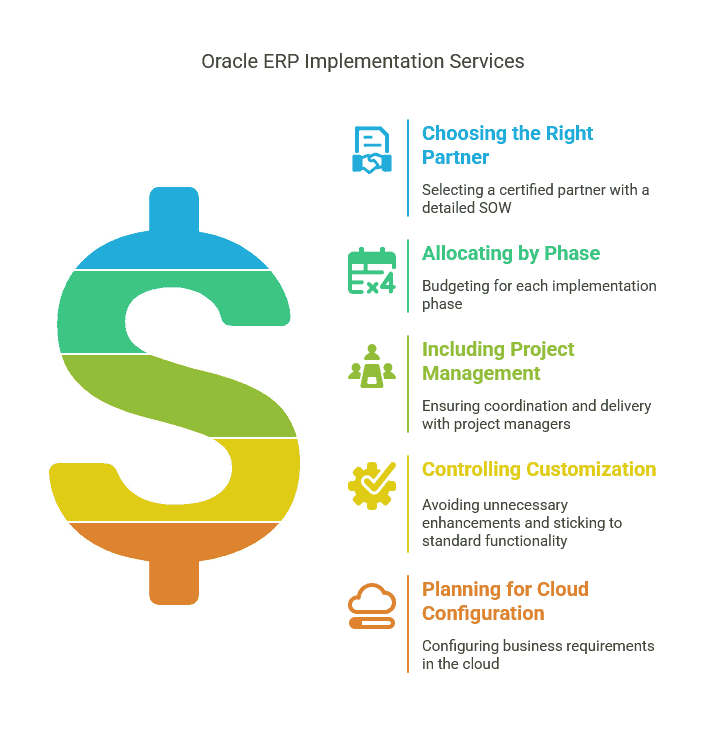Table of Contents:
Implementing an Oracle ERP system is a major investment that requires careful financial planning. CIOs, CFOs, and IT leaders must build a comprehensive budget that covers all aspects of the project, especially for modern cloud and hybrid Oracle ERP deployments.
ERP projects can cost 3–4% of a company’s annual revenue when factoring in software, services, and support. To avoid costly surprises, it’s essential to plan across all key budgeting categories.
Below, we outline the core components and actionable guidance for each, helping you understand and control your total Oracle ERP cost.
What to Keep in Mind for Your Oracle ERP Implementation Costs
-
1. Software Licensing and Subscriptions
Plan for Oracle ERP software costs up front. Whether you’re adopting Oracle Fusion Cloud or a hybrid model, licensing will be a significant line item:
- Understand Your License Model: SaaS subscriptions and perpetual licenses offer different cost structures. Plan based on user counts and required modules.
- Include Maintenance/Support Fees: Cloud fees often include support, but on-premises components typically require 20% annual support.
- Plan for Growth: Forecast future user growth and module expansion. Negotiate multi-year pricing to mitigate cost escalations.
- Optimize and Negotiate: Audit current licenses and use programs like Oracle’s BYOL to avoid duplicate spend.
When figuring out the cost of implementing an ERP system, it’s essential to understand how licensing fees scale with users and functionality.
-
2. Implementation Services
Budget for expert services across all phases. Oracle ERP implementation cost often rivals software costs.
- Choose the Right Partner: Use a certified Oracle partner and require a detailed Statement of Work.
- Allocate by Phase: Include planning, configuration, integration, testing, deployment, and go-live support.
- Include Project Management: Internal or external project managers are essential for coordination and delivery.
- Control Customization: Avoid unnecessary enhancements and stay close to standard Oracle functionality.
- Plan for Cloud Configuration: Even in the cloud, business requirements need to be properly configured.
Proper budgeting ensures your Oracle ERP implementation cost is controlled and aligned with business value.
-
3. Data Migration
Data migration is complex and often underestimated.
- Assess Data Scope: Identify legacy systems, master data, and transaction history.
- Include Data Cleansing: Allocate budget for validation, transformation, and business user review.
- Use the Right Tools: Oracle and third-party migration tools can accelerate the process.
- Plan Multiple Test Runs: Budget for iterative testing to ensure smooth go-live.
- Secure Legacy Access: Consider archiving or read-only access for historical data.
-
4. Training and User Adoption
Training ensures ROI and drives user success.
- Comprehensive Training Programs: Allocate for end-user, power-user, and administrator training.
- Role-Based Training: Tailor training by department and job function.
- Train-the-Trainer Approach: Train internal champions to scale adoption.
- Ongoing Education: Plan for refreshers, new hire training, and quarterly Oracle Cloud updates.
- User Adoption Initiatives: Create job aids, quick guides, and recognition programs.
Learn more about how Oracle can help you tap into new business opportunities:
-
5. Change Management
Manage the people side of transformation.
- Change Management Plan: Budget for internal communications, FAQs, and stakeholder engagement.
- Stakeholder Engagement: Host workshops and involve business unit leads early.
- Address Resistance: Include coaching or supplemental training for impacted teams.
- Process Documentation: Update SOPs and workflows to match the new system.
- Culture and Incentives: Consider small incentives to promote adoption.
-
6. Integration and Interfaces
Ensure your Oracle ERP works in your broader ecosystem.
- Integration Tools or Middleware: Budget for Oracle Integration Cloud or other platforms.
- Custom Interface Development: Each system-to-system connection may require development time.
- Data Mapping and Transformation: Allocate for mapping and testing data flows.
- Integration Maintenance: Set aside funds for monitoring and updating post go-live.
- Prioritize Critical Integrations: Phase less critical integrations to manage costs.
-
7. Support and Maintenance
Support is an ongoing operational cost.
- Post-Go-Live Support (Hypercare): Plan for intensive support during the first 30–90 days.
- Internal Support Team: Budget for ERP analysts or help desk staff.
- Vendor Support and Maintenance Fees: Include Oracle support contracts or premier support tiers.
- Upgrades and Enhancements: For cloud, factor in testing new releases. For hybrid, budget for future upgrades.
- Managed Services Option: Consider Vigilant’s Oracle managed services for predictable, expert support.
-
8. Contingency and Risk Buffer
Prepare for the unexpected.
- Set a Realistic Contingency Percentage: Allocate 10–15% of the total project budget.
- Identify Potential Risks: Examples include scope creep, data issues, or personnel turnover.
- Govern Use of Contingency: Define an approval process for releasing funds.
- Monitor and Adjust: Track budget consumption and reassess as needed.
- Learn from the Process: Document how contingency was used for future planning.
Conclusion
Budgeting for an Oracle ERP implementation requires a 360-degree view of both costs and risks. By proactively planning across these categories, organizations can stay on schedule, reduce surprises, and set themselves up for long-term success.
Need help managing your Oracle ERP cost or planning for a cloud implementation?
Contact Vigilant Technologies to speak with one of our experts.
We help clients design implementation plans that are right-sized, cost-effective, and strategically aligned. Let’s talk about your Oracle roadmap today.







